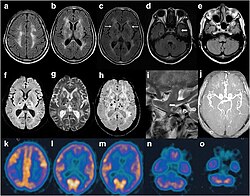Fatal insomnia

Editor-In-Chief: Prab R Tumpati, MD
Obesity, Sleep & Internal medicine
Founder, WikiMD Wellnesspedia &
W8MD's medical weight loss NYC, sleep center NYC
Philadelphia medical weight loss and Philadelphia sleep clinics
| Fatal insomnia | |
|---|---|

| |
| Synonyms | N/A |
| Pronounce | N/A |
| Specialty | N/A |
| Symptoms | Insomnia, hallucinations, delirium, confusion, autonomic dysfunction |
| Complications | N/A |
| Onset | Middle adulthood |
| Duration | Months to a few years |
| Types | Fatal familial insomnia, Sporadic fatal insomnia |
| Causes | Prion disease |
| Risks | Genetic mutation in the PRNP gene |
| Diagnosis | Polysomnography, Genetic testing, MRI |
| Differential diagnosis | Other prion diseases, Alzheimer's disease, Lewy body dementia |
| Prevention | N/A |
| Treatment | Supportive care |
| Medication | N/A |
| Prognosis | Poor, invariably fatal |
| Frequency | Extremely rare |
| Deaths | N/A |
Fatal Insomnia[edit]




Fatal insomnia is a rare disorder characterized by difficulty sleeping, which gradually worsens over time. Other symptoms may include speech and coordination problems, as well as dementia. This prion disease of the brain eventually leads to death within months to years.
Signs and Symptoms[edit]
Fatal insomnia progresses through four stages: Increasing insomnia, leading to panic attacks, paranoia, and phobias (about 4 months) Hallucinations and panic attacks become noticeable (about 5 months) Complete inability to sleep, accompanied by rapid weight loss (about 3 months) Dementia, unresponsiveness, or muteness, followed by death (about 6 months) Additional symptoms may include profuse sweating, pinpoint pupils, sudden menopause for women or impotence for men, neck stiffness, elevated blood pressure and heart rate, and constipation.
Cause[edit]
Fatal insomnia is caused by a mutation in the protein PrPC. It has two forms: Fatal Familial Insomnia (FFI), which is autosomal dominant, and Sporadic Fatal Insomnia (sFI), which is due to a non-inherited mutation.
Diagnosis[edit]
Diagnosis is typically based on a sleep study, PET scan, and genetic testing.
Treatments[edit]
There is currently no known cure for fatal insomnia. Treatment involves supportive care, and sleeping pills have not been found helpful.
Prognosis[edit]
The disorder is invariably fatal, with life expectancy ranging from 7 months to 6 years, and an average of 18 months.
Epidemiology[edit]
Cases of fatal insomnia have been reported in various countries, including Italy, the United States, and the Netherlands. The age of onset varies from 18 to 60 years, with an average of 50.
|
|
|
See also[edit]
| Prion diseases and transmissible spongiform encephalopathy | ||||||||||||
|---|---|---|---|---|---|---|---|---|---|---|---|---|
|
Creutzfeldt-Jakob Disease
Prion Diseases
Fatal Familial Insomnia
Sporadic Fatal Insomnia
Ad. Transform your life with W8MD's Budget GLP-1 injections from $75


W8MD offers a medical weight loss program to lose weight in Philadelphia. Our physician-supervised medical weight loss provides:
- Weight loss injections in NYC (generic and brand names):
- Zepbound / Mounjaro, Wegovy / Ozempic, Saxenda
- Most insurances accepted or discounted self-pay rates. We will obtain insurance prior authorizations if needed.
- Generic GLP1 weight loss injections from $75 for the starting dose.
- Also offer prescription weight loss medications including Phentermine, Qsymia, Diethylpropion, Contrave etc.
NYC weight loss doctor appointmentsNYC weight loss doctor appointments
Start your NYC weight loss journey today at our NYC medical weight loss and Philadelphia medical weight loss clinics.
- Call 718-946-5500 to lose weight in NYC or for medical weight loss in Philadelphia 215-676-2334.
- Tags:NYC medical weight loss, Philadelphia lose weight Zepbound NYC, Budget GLP1 weight loss injections, Wegovy Philadelphia, Wegovy NYC, Philadelphia medical weight loss, Brookly weight loss and Wegovy NYC
|
WikiMD's Wellness Encyclopedia |
| Let Food Be Thy Medicine Medicine Thy Food - Hippocrates |
Medical Disclaimer: WikiMD is not a substitute for professional medical advice. The information on WikiMD is provided as an information resource only, may be incorrect, outdated or misleading, and is not to be used or relied on for any diagnostic or treatment purposes. Please consult your health care provider before making any healthcare decisions or for guidance about a specific medical condition. WikiMD expressly disclaims responsibility, and shall have no liability, for any damages, loss, injury, or liability whatsoever suffered as a result of your reliance on the information contained in this site. By visiting this site you agree to the foregoing terms and conditions, which may from time to time be changed or supplemented by WikiMD. If you do not agree to the foregoing terms and conditions, you should not enter or use this site. See full disclaimer.
Credits:Most images are courtesy of Wikimedia commons, and templates, categories Wikipedia, licensed under CC BY SA or similar.
Translate this page: - East Asian
中文,
日本,
한국어,
South Asian
हिन्दी,
தமிழ்,
తెలుగు,
Urdu,
ಕನ್ನಡ,
Southeast Asian
Indonesian,
Vietnamese,
Thai,
မြန်မာဘာသာ,
বাংলা
European
español,
Deutsch,
français,
Greek,
português do Brasil,
polski,
română,
русский,
Nederlands,
norsk,
svenska,
suomi,
Italian
Middle Eastern & African
عربى,
Turkish,
Persian,
Hebrew,
Afrikaans,
isiZulu,
Kiswahili,
Other
Bulgarian,
Hungarian,
Czech,
Swedish,
മലയാളം,
मराठी,
ਪੰਜਾਬੀ,
ગુજરાતી,
Portuguese,
Ukrainian


